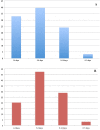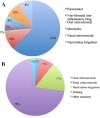Olfactory and gustatory dysfunctions as a clinical presentation of mild-to-moderate forms of the coronavirus disease (COVID-19): a multicenter European study
- PMID: 32253535
- PMCID: PMC7134551
- DOI: 10.1007/s00405-020-05965-1
Olfactory and gustatory dysfunctions as a clinical presentation of mild-to-moderate forms of the coronavirus disease (COVID-19): a multicenter European study
Abstract
Objective: To investigate the occurrence of olfactory and gustatory dysfunctions in patients with laboratory-confirmed COVID-19 infection.
Methods: Patients with laboratory-confirmed COVID-19 infection were recruited from 12 European hospitals. The following epidemiological and clinical outcomes have been studied: age, sex, ethnicity, comorbidities, and general and otolaryngological symptoms. Patients completed olfactory and gustatory questionnaires based on the smell and taste component of the National Health and Nutrition Examination Survey, and the short version of the Questionnaire of Olfactory Disorders-Negative Statements (sQOD-NS).
Results: A total of 417 mild-to-moderate COVID-19 patients completed the study (263 females). The most prevalent general symptoms consisted of cough, myalgia, and loss of appetite. Face pain and nasal obstruction were the most disease-related otolaryngological symptoms. 85.6% and 88.0% of patients reported olfactory and gustatory dysfunctions, respectively. There was a significant association between both disorders (p < 0.001). Olfactory dysfunction (OD) appeared before the other symptoms in 11.8% of cases. The sQO-NS scores were significantly lower in patients with anosmia compared with normosmic or hyposmic individuals (p = 0.001). Among the 18.2% of patients without nasal obstruction or rhinorrhea, 79.7% were hyposmic or anosmic. The early olfactory recovery rate was 44.0%. Females were significantly more affected by olfactory and gustatory dysfunctions than males (p = 0.001).
Conclusion: Olfactory and gustatory disorders are prevalent symptoms in European COVID-19 patients, who may not have nasal symptoms. The sudden anosmia or ageusia need to be recognized by the international scientific community as important symptoms of the COVID-19 infection.
Keywords: Anosmia; COVID; COVID-19; Coronavirus; Dysgeusia; ENT; Gustatory; Hyposmia; Infection; Loss; Olfaction; Olfactory; SARS-CoV-2; Smell; Taste.
Conflict of interest statement
The authors have no conflicts of interest.
Figures




Comment in
-
The role of self-reported olfactory and gustatory dysfunction as a screening criterion for suspected COVID-19.Eur Arch Otorhinolaryngol. 2020 Aug;277(8):2389-2390. doi: 10.1007/s00405-020-05999-5. Epub 2020 Apr 24. Eur Arch Otorhinolaryngol. 2020. PMID: 32328771 Free PMC article. No abstract available.
-
Comment to the article "Olfactory and gustatory dysfunctions as a clinical presentation of mild-to-moderate forms of the coronavirus disease (COVID-19): a multicenter European study".Eur Arch Otorhinolaryngol. 2020 Aug;277(8):2391-2392. doi: 10.1007/s00405-020-06024-5. Epub 2020 May 7. Eur Arch Otorhinolaryngol. 2020. PMID: 32383095 Free PMC article. No abstract available.
-
Gustatory dysfunctions in COVID-19 patients: possible involvement of taste renin-angiotensin system (RAS).Eur Arch Otorhinolaryngol. 2020 Aug;277(8):2395. doi: 10.1007/s00405-020-06054-z. Epub 2020 May 20. Eur Arch Otorhinolaryngol. 2020. PMID: 32435852 Free PMC article. No abstract available.
-
Dysgeusia in COVID-19: Possible Mechanisms and Implications.Oral Surg Oral Med Oral Pathol Oral Radiol. 2020 Sep;130(3):344-346. doi: 10.1016/j.oooo.2020.06.016. Epub 2020 Jun 27. Oral Surg Oral Med Oral Pathol Oral Radiol. 2020. PMID: 32703719 Free PMC article. No abstract available.
-
Presentation with Anosmia and Ageusia: Possible Hidden Carriers of COVID-19.South Med J. 2020 Aug;113(8):399-400. doi: 10.14423/SMJ.0000000000001123. South Med J. 2020. PMID: 32747969 Free PMC article. No abstract available.
References
-
- Ramanathan K, Antognini D, Combes A, Paden M, Zakhary B, Ogino M, MacLaren G, Brodie D, Shekar K. Planning and provision of ECMO services for severe ARDS during the COVID-19 pandemic and other outbreaks of emerging infectious diseases. Lancet Respir Med. 2020 doi: 10.1016/s2213-2600(20)30121-1. - DOI - PMC - PubMed
Publication types
MeSH terms
LinkOut - more resources
Full Text Sources
Other Literature Sources
Medical
Research Materials
Miscellaneous

